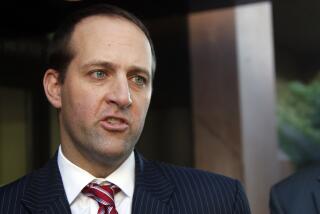Major Figure Pleads Guilty to Fraud in Pentagon Probe
- Share via
WASHINGTON — Former defense consultant William L. Parkin, wan and haggard nine days after an unsuccessful suicide attempt, withdrew his claims of innocence in the Pentagon procurement scandal Monday and admitted that he had bribed a Navy official in schemes to win lucrative contracts for his corporate clients.
As he kept his eyes downcast and his head bowed, the 65-year-old Parkin was asked three times by U.S. District Judge Claude Hilton how he pleaded to counts of fraud, bribery and wire fraud. Three times, he whispered: “Guilty.”
The charges against Parkin, who had been a central target in the massive federal investigation of corruption in the Pentagon procurement process, carry a maximum penalty of 25 years in prison and $750,000 in fines. Hilton set sentencing for June 3.
In addition, the conviction potentially enlists Parkin as another star witness for the government, which now has struck deals with three leading defendants in the inquiry, apparently in an attempt to build cases against high-ranking persons who have not been indicted.
Those persons apparently include former Assistant Navy Secretary Melvyn R. Paisley and former defense consultant William M. Galvin.
“They have clearly decided to focus on Paisley and Galvin,” a defense attorney involved in the case said in the wake of the recent flurry of plea bargains. “They think they’ve got ‘em in their sights.”
Attorneys for Paisley and Galvin have insisted that their clients are guilty of no wrongdoing.
“We’re still sitting here waiting,” said Galvin attorney William Nussbaum, who noted that Galvin has not been charged with any crimes.
Robert Plotkin, an attorney for Paisley, refused to comment on Parkin’s guilty pleas.
The principal prosecutor in the case, Assistant U.S. Atty. Joseph Aronica, refused to say whether he expects Parkin’s cooperation to bolster a criminal case against the two.
But he said that Parkin’s promise to testify against all “confederates, accomplices and co-defendants” would “advance the investigation” beyond the conspiracy to which the former defense consultant pleaded guilty Monday.
“The investigation is moving forward across the board,” Aronica said.
Prosecution documents have alleged that Parkin, who rose to the top civil service ranks in the Navy before establishing a consulting business in late 1982, operated for nearly six years at the center of a network of consultants who bribed Pentagon officials for inside information and sold it to contractors eager to get an edge on their competitors.
Among Parkin’s close associates after he left his post as acquisition chief for the Navy’s Joint Cruise Missile Project was Galvin, the high-powered consultant who was a partner of Paisley.
Parkin once boasted that he had obtained Paisley’s assistance in steering a contract to the Northrop Corp., according to a federal affidavit filed last summer.
The charges to which Parkin admitted guilt relate to his dealings with Los Angeles-based consultant Fred H. Lackner and Navy purchasing officer Stuart E. Berlin. He was part of a scheme to obtain favored Pentagon treatment for Teledyne Industries Inc. of Newbury Park, Calif., and Hazeltine Corp., a subsidiary of St. Louis-based Emerson Electric Co.
Under the arrangement, which has been detailed in previous indictments and guilty pleas, Parkin agreed to share his consulting fees with Berlin and, allegedly, with Lackner in return for assistance that was to bring a contract for the AN/APM 424 radar test gear to Teledyne and the award of a different Navy electronics project to Hazeltine.
Parkin’s plea in the scheme is the latest in a series that began in January, when Hazeltine and two of its executives agreed to plea bargains.
Through his attorney and in interviews, Parkin long had maintained his innocence and complained angrily that the investigation had exhausted his finances and destroyed his personal life.
At his arraignment in January, he disguised himself with a false beard and baseball cap in an attempt to elude photographers. Then, on March 18, with his trial scheduled to begin just nine days later, Parkin took an overdose of sleeping pills in what police said was an unsuccessful suicide attempt.
While he was recovering last week, Berlin and Teledyne implicated him in their own pleas of guilt. That apparently persuaded Parkin to abandon his fight.
“We thought this was an appropriate place to stop,” his attorney, Gerard F. Treanor, said Monday.
Treanor said that Parkin’s health is “improving.” But the former consultant, who has grown a flowing white beard, appeared ashen and wrung his hands nervously as the judge spoke to him.
Lackner and three Teledyne employees face trial next week on charges alleging their involvement in the scheme.
Neither they nor their attorneys could be reached for comment on Monday.
More to Read
Sign up for Essential California
The most important California stories and recommendations in your inbox every morning.
You may occasionally receive promotional content from the Los Angeles Times.










